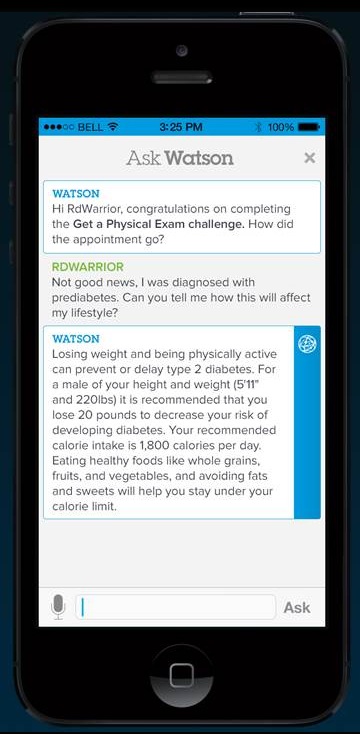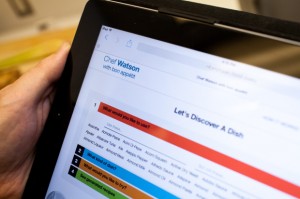 IBM's Watson, a cognitive computing system originally designed to vanquish human competitors on Jeopardy in 2011, has been winding its way into more and more healthcare and health-related use cases. But like most novel technologies, a number of people still don't understand exactly what Watson is or does -- or what IBM's roadmap for the technology is. On the sidelines of the Health 2.0 event in Santa Clara, California last week, MobiHealthNews sat down with John Wolpert, product manager for IBM's Watson Ecosystem, to answer some of these questions.
IBM's Watson, a cognitive computing system originally designed to vanquish human competitors on Jeopardy in 2011, has been winding its way into more and more healthcare and health-related use cases. But like most novel technologies, a number of people still don't understand exactly what Watson is or does -- or what IBM's roadmap for the technology is. On the sidelines of the Health 2.0 event in Santa Clara, California last week, MobiHealthNews sat down with John Wolpert, product manager for IBM's Watson Ecosystem, to answer some of these questions.
What is Watson?
Watson isn't a software program or a single algorithm or an actual physical supercomputer sitting in a room somewhere at IBM. When IBM researchers talk about "Watson," they're actually talking about a suite of computing capabilities that combine together to perform a function -- taking large, unstructured data sets in the English language and pulling answers to queries out of that data. Oftentimes that function can be run from a desktop computer or a mobile device, but the computing power is located in the cloud, on IBM's servers.
Cognitive computing like Watson does is often very computationally intensive and expensive, and one of the challenges IBM has face with Watson is scaling that level of computing.
"People don’t talk about it a lot, but I think every bit as exciting a story here is not just the algorithms, which are a lot of things known in machine learning, plus a lot of our secret sauce. But, at the end of the day, machine learning, cognitive computing, it’s fair to say that it’s more computationally intensive, and computationally expensive than older forms of popularity ranking, or other more basic forms of systems that are applied to knowledge," Wolpert said. "So you have to have systems that are able to punch heavy enough, that are affordable and low power enough. That’s part of the big news -- when you marry what we’ve got operating in the cloud, behind the API, with computers that are for the first time in history powerful enough to perform those kinds of services without just breaking the bank every time somebody runs a query."
 CafeWell Concierge, a Welltok app, uses Watson to advise users about their health.
CafeWell Concierge, a Welltok app, uses Watson to advise users about their health.
The suite of capabilities Watson brings to bear on healthcare problems is large and complex, but Wolpert broke down a few of the key points. Starting out on Jeopardy wasn't just a publicity stunt for the system, it gave Watson's engineers something to build towards, and informed some of the major capabilities Watson still relies on today.
"The Apollo 13 mission's Gene Kranz (or at least Ed Harris's portrayal of him) famously said ‘I don’t care what a thing is designed to do, I care what it can do’," Wolpert said. "Well, Watson was designed to win Jeopardy. But in order to do that we had to learn some things that might be extensible for other problems. Not a lot of people talk about what specifically those widgets are."
The first thing Watson learned to do for Jeopardy was to "disambiguate linguistic anomalies" or, in plain English, to understand plain English. This means, among many other things, taking colloquialisms in stride, like "feet smell" and "houses burn up before they burn down". But the programmers haven't hardwired any of that in -- instead Watson has to learn to understand English, and to do it without ever processing language on the same level humans do.
"We’re not hard coding that feet smell," Wolpert said. "It’s based on a large corpus of data and training and learning from that. Specifically, it’s approaching that from a mathematical perspective. It’s not approaching that the way we do. It’s thinking in so far as it’s running a set of processes. It’s putting that information together."
Second, Watson had to buzz in with its answer within three seconds, with a confidence score, which means it has to be both fast and have an awareness of how well it did finding an answer. The confidence score functionality has obvious implications in healthcare, and has already shown up as part of the Watson deployment at Memorial Sloan Kettering.
Finally, Watson has to work with a large body of text with no links in it -- something that materially separates it from search engines like Google, which use links as a kind of ersatz crowdsourcing in helping to return a relevant answer. And one more piece of functionality that Watson has acquired since Jeopardy is the ability to handle "questions" that are much bigger than a few sentences. In the case of the Sloan Kettering work, for instance, the query is an entire patient case file. And Watson is equipped to handle complex questions, within the right context.
Where is Watson headed next?
The team at IBM will continue to steer Watson into new territory. Just recently the company announced the second of four phases of Watson in the pipeline, according to Wolpert (the first was the question and answer engine that debuted on Jeopardy). The Watson Discovery Advisor allows Watson to go to work on large data sets looking for patterns, rather than the answer to a specific question. Bon Appetit's Chef Watson program uses Discovery Advisor, but it's also been set to work on research projects. For instance, Watson has worked with Baylor College of Medicine to help advance the study of kinases, a not-yet-well understood enzyme that can sometimes indicate cancer.
 "The entire field of kinase researchers, worldwide, will produce one therapeutic target a year," said Wolpert. "We fed Watson all of the kinase research, just unstructured text of those journal articles and MedLine abstracts and stuff like that. And it found six high probability targets in one go. Just because it was able to consume all of everyone’s knowledge simultaneously, draw the connections, find co-ocurrences and, with a practitioner, with people who know this kind of research, it’s just invaluable."
"The entire field of kinase researchers, worldwide, will produce one therapeutic target a year," said Wolpert. "We fed Watson all of the kinase research, just unstructured text of those journal articles and MedLine abstracts and stuff like that. And it found six high probability targets in one go. Just because it was able to consume all of everyone’s knowledge simultaneously, draw the connections, find co-ocurrences and, with a practitioner, with people who know this kind of research, it’s just invaluable."
After the discovery analysis, the next two phases in the pipeline are a policy advisor, which will be able to deal with probabilistic thinking, and a decision advisor, which will bring Watson back around to the sort of work it was doing at Memorial Sloan Kettering, but making that scalable and extensible.
While they advance the capabilities of the system, IBM is turning the keys to Watson -- specifically a new API that has grown considerably from the one that won Jeopardy -- over to business partners that think they can do big things with the capabilities Watson has already shown off. A few healthcare examples, MD Buyline and Welltok's Cafewell, kicked off last fall. Watson also recently announced a partnership with the Mayo Clinic.
"If you’re a company that has a large body of English language sentences, and you have an appetite to make IBM Watson a partner, we’ll give you access to Watson and you can use these properties and the other ones that are more esoteric to build really cool stuff," Wolpert said. "And we’re betting on you at that point. We’re going to make money only when you make money. Which I don’t remember us ever doing before as a business model."

















